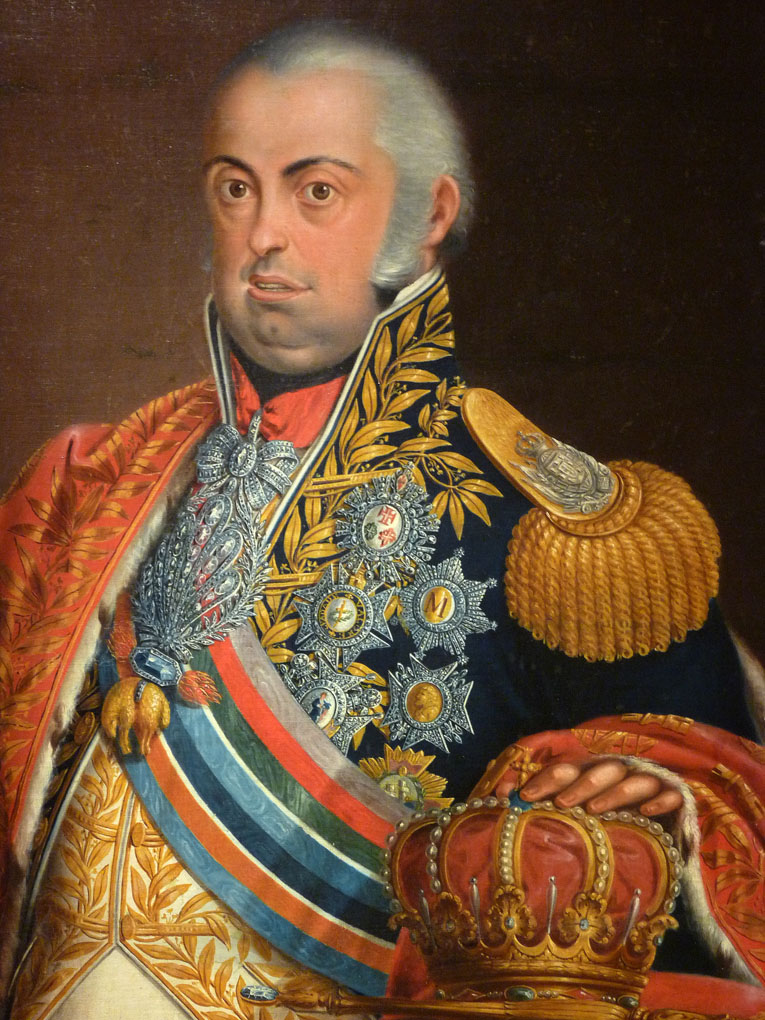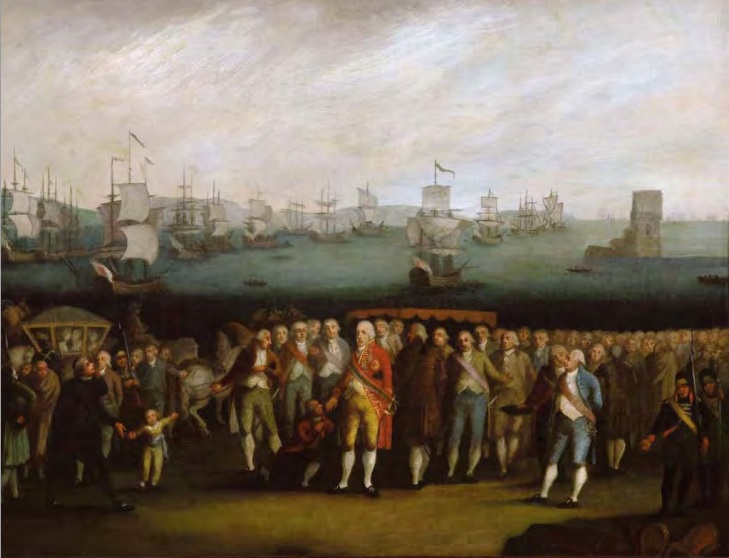Descendants of John VI of Portugal on:
[Wikipedia]
[Google]
[Amazon]
 The Descendants of John VI of Portugal, of the House of Braganza, would play a role in Portuguese imperial affairs, global royalty, and major historical events of their time. John's marriage to Carlota Joaquina of Spain, which was not a content one, produced many children which would be key players in the world at their time
His descendants can be found in both reigning and non-reigning royal families of Europe and Brazil; in fact, mainly through his second son, Miguel, nicknamed the "Grandfather of Europe:, his descendants nowadays rule in Belgium, Luxemburg, Liechtenstein, and were claimants to the thrones of Portugal, Austria, and the former Duchy of Parma.
This article deals with the children of John VI and in turn their senior heirs.
The Descendants of John VI of Portugal, of the House of Braganza, would play a role in Portuguese imperial affairs, global royalty, and major historical events of their time. John's marriage to Carlota Joaquina of Spain, which was not a content one, produced many children which would be key players in the world at their time
His descendants can be found in both reigning and non-reigning royal families of Europe and Brazil; in fact, mainly through his second son, Miguel, nicknamed the "Grandfather of Europe:, his descendants nowadays rule in Belgium, Luxemburg, Liechtenstein, and were claimants to the thrones of Portugal, Austria, and the former Duchy of Parma.
This article deals with the children of John VI and in turn their senior heirs.
 John, born on 13 May 1767 in
John, born on 13 May 1767 in
 The Descendants of John VI of Portugal, of the House of Braganza, would play a role in Portuguese imperial affairs, global royalty, and major historical events of their time. John's marriage to Carlota Joaquina of Spain, which was not a content one, produced many children which would be key players in the world at their time
His descendants can be found in both reigning and non-reigning royal families of Europe and Brazil; in fact, mainly through his second son, Miguel, nicknamed the "Grandfather of Europe:, his descendants nowadays rule in Belgium, Luxemburg, Liechtenstein, and were claimants to the thrones of Portugal, Austria, and the former Duchy of Parma.
This article deals with the children of John VI and in turn their senior heirs.
The Descendants of John VI of Portugal, of the House of Braganza, would play a role in Portuguese imperial affairs, global royalty, and major historical events of their time. John's marriage to Carlota Joaquina of Spain, which was not a content one, produced many children which would be key players in the world at their time
His descendants can be found in both reigning and non-reigning royal families of Europe and Brazil; in fact, mainly through his second son, Miguel, nicknamed the "Grandfather of Europe:, his descendants nowadays rule in Belgium, Luxemburg, Liechtenstein, and were claimants to the thrones of Portugal, Austria, and the former Duchy of Parma.
This article deals with the children of John VI and in turn their senior heirs.
Background on John VI
 John, born on 13 May 1767 in
John, born on 13 May 1767 in Lisbon
Lisbon (; pt, Lisboa ) is the capital and largest city of Portugal, with an estimated population of 544,851 within its administrative limits in an area of 100.05 km2. Lisbon's urban area extends beyond the city's administrative limits w ...
, was the second son of King Maria I
, succession = Queen of Portugal
, image = Maria I, Queen of Portugal - Giuseppe Troni, atribuído (Turim, 1739-Lisboa, 1810) - Google Cultural Institute.jpg
, caption = Portrait attributed to Giuseppe Troni,
, reign ...
and Pedro III.
Throne of Portugal
When John was born, his brother, José, Prince of Brazil, was the heir to their mother, Maria I of Portugal. It was only after José's death bysmallpox
Smallpox was an infectious disease caused by variola virus (often called smallpox virus) which belongs to the genus Orthopoxvirus. The last naturally occurring case was diagnosed in October 1977, and the World Health Organization (WHO) c ...
, in 1788, that John became the heir to the Portuguese throne. By this time, John was already 21 years old and he had not been groomed to become monarch, as his brother was so famously, and rigorously, done. He was said to have been uncultured, stupid, and ill-mannered, which worried the kingdom.
In 1799, John became Prince regent
A prince regent or princess regent is a prince or princess who, due to their position in the line of succession, rules a monarchy as regent in the stead of a monarch regnant, e.g., as a result of the sovereign's incapacity (minority or illne ...
for his mother, who had been declared unable to reign, owing to her mental illness. At the same time, Napoleon Bonaparte
Napoleon Bonaparte ; it, Napoleone Bonaparte, ; co, Napulione Buonaparte. (born Napoleone Buonaparte; 15 August 1769 – 5 May 1821), later known by his regnal name Napoleon I, was a French military commander and political leader wh ...
had taken control of France through his coup-d'etat, the 18 Brumaire
The Coup d'état of 18 Brumaire brought Napoleon Bonaparte to power as First Consul of France. In the view of most historians, it ended the French Revolution and led to the Coronation of Napoleon as Emperor. This bloodless '' coup d'état'' ove ...
. Spain and France would soon sign a treaty and declare war and attempt to invade Portugal
Portugal, officially the Portuguese Republic ( pt, República Portuguesa, links=yes ), is a country whose mainland is located on the Iberian Peninsula of Southwestern Europe, and whose territory also includes the Atlantic archipelagos of th ...
, starting the War of the Oranges
The War of the Oranges ( pt, Guerra das Laranjas; french: Guerre des Oranges; es, Guerra de las Naranjas) was a brief conflict in 1801 in which Spanish forces, instigated by the government of France, and ultimately supported by the French mi ...
. While peace was eventually attained, Portugal and its empire suffered territorial losses.
Portugal was the last country on the continent to not have joined the Continental System, John having tried to push his answer as long as he could. In 1807, France grew restless and finally sent troops on their way to Portugal, to force submission. To safeguard the House of Braganza and its rule over the Portuguese Empire
The Portuguese Empire ( pt, Império Português), also known as the Portuguese Overseas (''Ultramar Português'') or the Portuguese Colonial Empire (''Império Colonial Português''), was composed of the overseas colonies, factories, and the ...
, John moved the Portuguese court and capital to a safer location in the empire, Colonial Brazil. To satisfy the etiquette required by European society, John raised Brazil to a kingdom, forming the United Kingdom of Portugal, Brazil, and the Algarves.
In Rio de Janeiro
Rio de Janeiro ( , , ; literally 'River of January'), or simply Rio, is the capital of the state of the same name, Brazil's third-most populous state, and the second-most populous city in Brazil, after São Paulo. Listed by the GaWC as a b ...
, John established his court. In 1816, Maria I died and John was acclaimed King John VI of Portugal, Brazil, and the Algarves. By this time, Napoleon had been defeated and European courts demanded the return of the Portuguese court to Europe, which John eventually did, but leaving Pedro, Prince Royal as regent of Brazil. Refusing to return to Europe, Pedro declared Brazilian Independence.
When John died, a crisis of succession would occur over the Portuguese throne, a crisis fueled by John's children. It is John's eldest sons and granddaughter that would split the House of Braganza into three branches, the original House of Braganza, the Brazilian House of Braganza, and the Miguelist House of Braganza.
Descendants
On 8 May 1785, John married Carlota Joaquina of Spain. The couple had 9 children.Maria Teresa of Braganza, Princess of Beira
Francisco António of Braganza, Prince of Beira
Maria Isabel of Braganza
Pedro I & IV
As Pedro IV of Portugal (senior branch)
As Pedro I of Brazil (junior branch)
Maria Francisca of Braganza
Isabel Maria of Braganza
Miguel I of Portugal
Maria da Assunção of Braganza
Ana de Jesus Maria of Braganza
See also
* Descendants of Manuel I of Portugal * Descendants of Miguel I of Portugal {{Portuguese infantas Portuguese nobility Portuguese royalty House of Braganza John VI of Portugal John VI of Portugal